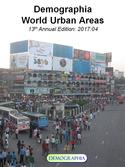President Donald Trump’s recent renunciation of the Paris climate change accords has spurred “the international community” to pronounce America’s sudden exit from global leadership. Now you read in the media aspirations to look instead to Europe, Canada, or even China, to dominate the world. Some American intellectuals, viewing Trump, even wish we had lost our struggle for independence. read more »
Europe
The Evolving Urban Form: Prague
Prague is the capital of Czechia, a nation most readers have probably never heard of. Last year, the Czech Republic adopted a new name that does not reveal its governance structure (republic). The new name has not enjoyed widespread acclaim. The union of Czechoslovakia, which dates from the end of World War I, split peacefully in 1993, resulting in the creation of Czech Republic and Slovakia. read more »
- Login to post comments
The Evolving Urban Form: Budapest
The Budapest area has lost population overall since 1980, having fallen from 3.03 million to 2.99 million in 2016, according to Hungarian Central Statistical Office data as reported by citypopulation.de (Graphic 1). This 1.3 percent loss is smaller than the national population loss over the same period of 8.2 percent. Moreover, during the last five years, the Budapest area is estimated to have gained 1.7 percent, even as Hungary lost 1.1 percent. read more »
- Login to post comments
The globalization debate is just beginning
The decisive victory of Emmanuel Macron for president of France over Marine Le Pen is being widely hailed as a victory of good over evil, and an affirmation of open migration flows and globalization. Certainly, the defeat of the odious National Front should be considered good news, but the global conflict over trade and immigration has barely begun. read more »
- Login to post comments
The 37 Megacities and Largest Cities: Demographia World Urban Areas: 2017
Many of the world’s biggest cities are getting bigger still. In 2017, the number of megacities --- urban areas with better than ten million people --- increased to 37 in 2017, as the Chennai urban area entered their ranks. Chennai becomes India’s fourth megacity, along with Delhi, Mumbai and Kolkota. These are among the major findings in the just released 13th annual edition of Demographia World Urban Areas, which provides population, land area and population density estimates for the 1,040 identified built-up urban areas (cities) in the world. read more »
- Login to post comments
Death Spiral Demographics: The Countries Shrinking The Fastest
For most of recent history, the world has worried about the curse of overpopulation. But in many countries, the problem may soon be too few people, and of those, too many old ones. In 1995 only one country, Italy, had more people over 65 than under 15; today there are 30 and by 2020 that number will hit 35. Demographers estimate that global population growth will end this century. read more »
- Login to post comments
The Futility of Annual Top 10 Predictions
In every recent year, a black swan event has made top 10 lists appear quaintly naive and unimaginative. Our list is probably no better.
This time of year, top 10 predictions are all the rage. These lists can be interesting and entertaining but how useful are they really?
This question goes to the heart of forecasting. How futile or how useful is an attempt to forecast the economy, or technology, or world events for the next twelve months? There are three answers. read more »
- Login to post comments
'Two Regimes': A Visual Memory of Wartime Survival
At the corner of Maitland Avenue and Maitland Boulevard, the Holocaust Memorial Center is squeezed between tennis courts and a small courtyard, part of the Jewish Community Center. Inside, the classrooms are nicely squared off. The exhibit “Two Regimes” takes up one classroom’s walls with about 40 paintings depicting life during the Stalin and Hitler regimes for Jews living in Mariupol, Ukraine. From this industrial port town on the shore of the Azov Sea to a ramshackle stilt house in north Florida, the exhibit is a strange tale, partly told. read more »
- Login to post comments
Erasing Anglo cultural heritage risks what makes our republic diverse
It’s increasingly unfashionable to celebrate those who made this republic and established its core values. On college campuses, the media and, increasingly, in corporate circles, the embrace of “diversity” extends to demeaning the founding designers who arose from a white population that was 80 percent British. read more »
Solidarity, not Division: Understanding London’s East End
The East End of London has a long history of working-class community. It has been a place of industry, where the river Thames and the river Lea have provided work for many people. The area attracted many immigrants, including workers from Africa since Tudor times, sailors from China, former slaves from America, French Protestants facing religious persecution in the 1600s and Irish weavers working in the textile industries. There have been Jewish communities in the East End for centuries, too. The twentieth century saw an increase in immigrants from the former British colonies, including South Asia, particularly Bangladesh. Not only has it been a place to seek a livelihood, but it has also been a place of refuge. read more »
- Login to post comments



















